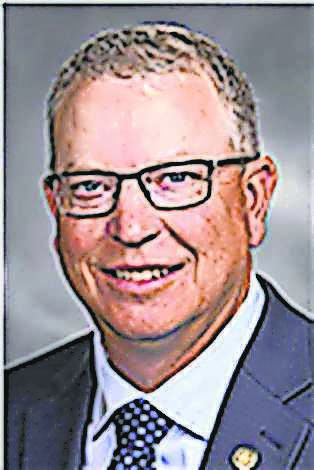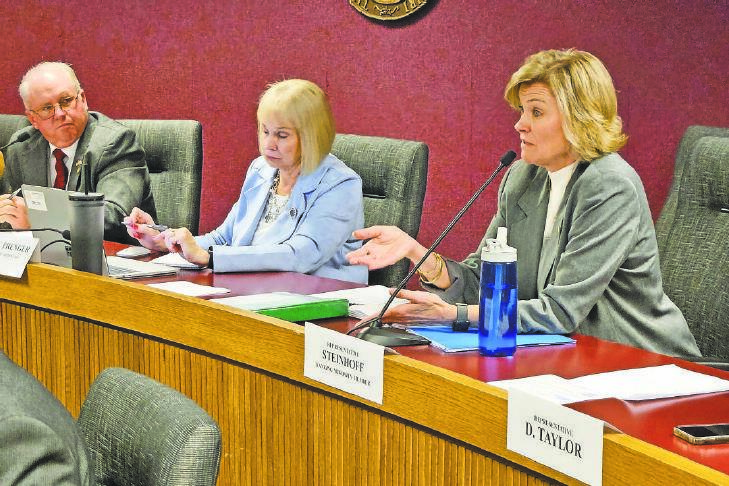State Rep Discusses Legislation; Seeks Teacher Nominees

As promised, the Missouri House of Representatives is honoring our commitment to prioritize families and children, passing several key pieces of legislation aimed at improving childcare access, expanding healthcare coverage and strengthening support for working parents.
As the Legislative Spring Break is upon the Missouri House of Representatives, I would like to reflect on the numerous accomplishments Members have achieved in support of our constituents at home.
SB 4, a significant piece of utility legislation in Missouri that introduces numerous policy changes affecting electricity, natural gas, water, sewage, and telecommunications has also been truly agreed to and finally passed in the Missouri General Assembly. The bill primarily focuses on altering how new power plants are financed and how utility rates are determined. The most contentious aspect of SB 4 is the repeal of a 1976 ban on Construction Work in Progress (CWIP), which would allow utilities to charge customers for new power plants before they are completed and generating electricity.
Under the current system, utilities must complete power plants before requesting rate increases from Missouri’s utility regulator. SB 4 eliminates this restriction, permitting companies to bill customers for new natural gas power plants before they are operational. The bill does include requirements that have to be met to move forward with a CWIP, in addition to proving the plant construction is in the public interest:
The timeframe to receive a CWIP would be limited by the schedule of the project. The available dollar amount to receive CWIP will be limited by the initial budget of the project. If the project fails to go into service within a designated reasonable amount of time, the customers get their money back with interest.
The bill includes provisions aimed at protecting consumers, such as refunding customers (with interest) if a plant is never completed. It includes provisions to create more oversight on the retirement of plants to ensure the stability and reliability of our electrical system, while ensuring that grid and generation investments will not result in any unfair costs. Additionally, SB 4 allows utilities to set rates based on projected future costs rather than past actual expenses, a method known as “future test year” rate setting. Another major provision requires electric utilities to submit 16-year demand projections and plans to meet those needs, including potential natural gas and nuclear plants that could qualify for CWIP charges.
Beyond power generation, SB 4 extends consumer protections against utility shut-offs during extreme temperatures, increasing the forecast window from 24 to 72 hours to prevent shut-offs during dangerously hot or cold weather. It also increases additional funding for the Public Service Commission (PSC) and the Office of Public Counsel (OPC), which represents consumer interests, to hire and train additional expertise in these matters.
HCS#2 HB 495, is a comprehensive public safety bill addressing crime, policing, and penalties for various offenses across the state. This week, the Missouri General Assembly truly agreed and finally passed this important piece of legislation. The bill includes new laws targeting criminal activities. The legislation strengthens child welfare protections by classifying first-degree child endangerment as a “dangerous felony,” particularly when fentanyl or similar drugs are involved. It also expands the definition of rioting and raises its penalties, eliminates the need to prove conspiracy, and allows for stricter sentencing. This bill takes necessary steps to improve public safety by addressing serious crime, strengthening law enforcement oversight, and ensuring consistency in policing policies.
HB 544, a bill concerning pesticide regulations and labeling requirements. This bill simply aligns state requirements with federal standards. The bill does not shield pesticide manufacturers from liability if their products are proven harmful.
HB 742, restricts the use of state funds for diversity, equity, and inclusion (DEI) initiatives within government agencies.
HB 68, changes the statute of limitations for personal injury claims. Under current law, individuals have five years from the date of an injury to file a lawsuit. This bill reduces that window to two years for injuries occurring after August 28, 2025.
HB 269, is a comprehensive bill aimed at addressing the state’s childcare crisis by incentivizing private contributions and employer-supported childcare solutions. The legislation establishes three key tax credit programs: the Child Care Contribution Tax Credit Act, the Employer Provided Child Care Assistance Tax Credit Act, and the Child Care Providers Tax Credit Act.
HBs 850, 53 & 482 expands access to childcare while maintaining safety and oversight. The legislation allows the Department of Elementary and Secondary Education to grant temporary childcare licenses to providers who seek to expand an existing site or open a new location.
HB 339 ensures greater protections for individuals who report concerns about childcare facilities. Under this legislation, the Department of Elementary and Secondary Education will continue to keep records of substantiated complaints against licensed childcare facilities but will now be prohibited from disclosing the identities of those who file complaints.
HB 243 & 280 protects the rights and safety of individuals seeking a divorce or legal separation. With its passage, courts in Missouri can no longer delay or deny a dissolution of marriage or legal separation based on pregnancy status.
HB 875 ensures that belief-based student associations—whether religious, political, or ideological—are granted the same benefits and recognition as other student groups on campus.
HB 247, makes vehicle registration more convenient for Missourians. Starting January 1, 2026, vehicle owners with cars less than six years old will have the option to register their vehicles for five years instead of the current one- or two-year renewal periods.
HBs 177 & 469, expands MO HealthNet coverage to include hearing aids and cochlear implants for all eligible individuals.
HB 14 the Missouri House Budget Committee has advanced a more than $1.9 billion supplemental spending bill to fund state agencies through June 30. The bill includes critical funding for public schools, summer food programs for children, and senior services such as home-delivered meals and transportation.
HB 943, makes several updates to the state’s health care system. It focuses on improving hospital funding, ambulance services, community paramedic programs, and public health policies.
HB 121, a bill aimed at expanding the state’s newborn safety incubator program. These incubators, which allow parents to safely leave their newborns without fear of prosecution, have already saved thousands of babies nationwide.
HB 225, is designed to enhance the flexibility and coordination of law enforcement agencies across jurisdictions, both within the state and beyond its borders. This bill allows the chief law enforcement executive of any agency in Missouri to request assistance from law enforcement agencies in other jurisdictions, including those outside the state but within the United States.
HB 629, a bill aimed at reducing personal property tax assessments and providing greater tax relief to Missouri residents. Beginning in 2026, the bill will reduce the assessment rate for personal property from 33.3% to 30% of its true value. It also prevents increases in the aggregate valuation of personal property from being counted as new construction, which affects how property taxes are calculated.
HB 999 introduces crucial reforms to Missouri’s property tax assessment process by ensuring counties adhere to fair and lawful assessment practices. This bill is necessary because improperly inflated property assessments have placed thousands of Missouri families at risk of losing their homes due to unsustainable tax burdens. By creating financial consequences for counties that fail to fairly assess property values, the bill provides a strong deterrent against overreach and ensures property owners are not unfairly taxed.
HJR 4, is a proposed constitutional amendment aimed at stabilizing property tax assessments for residential homeowners. If approved by voters, this measure would ensure that the assessed value of a home remains at its most recent previous assessment, with future reassessments capped at the lower of either 2% or the change in the Consumer Price Index (CPI). This measure is necessary to protect Missouri homeowners—particularly younger buyers—who are being priced out of the housing market due to escalating property taxes.
HB 816, gives county assessors more flexibility in determining the value of motor vehicles for tax assessments. Currently, assessors must use the National Automobile Dealers’ Association (NADA) guide to determine trade-in values.
HB 352, is aimed at improving financial reporting for non-charter counties while providing relief for small political subdivisions facing excessive fines. The bill extends the deadline for counties to publish annual financial statements from early March to June 30th, ensuring a more accurate reflection of county finances.
HB 711, allowing students to transfer to public schools outside their district, with districts opting in annually. The bill aims to give parents greater choice, particularly for students facing bullying or academic struggles.
Lawmakers will now return to the Missouri State Capitol on March 24 to begin the final weeks of the legislative session. When we return, House members will focus our efforts on approving the Fiscal Year 2026 state operating budget.
The state spending plan must be approved by both the House and Senate by Friday, May 9. The House and Senate will work to pass several other legislative priorities before the session concludes on Friday, May 16.
Teacher of the Year
District 41 is fortunate to have excellent educators in each and every school. It is my hope the residents of our area will reach out and nominate an outstanding educator for Missouri Teacher of the Year.
Nominations are now open for Regional Teacher of the Year—the first step toward becoming Missouri Teacher of the Year! Anyone can nominate an exceptional educator. The deadline to submit is April 14. Each year, over 30 outstanding teachers are selected across the state’s nine Regional Professional Development Centers, plus the Southwest Center for Educational Excellence.
The Missouri Department of Elementary and Secondary Education will announce regional winners this summer, with the 2025 Missouri Teacher of the Year revealed in September.
Submit a nomination today through the Missouri Department of Elementary and Secondary Education website Teacher of the Year nomination form.


